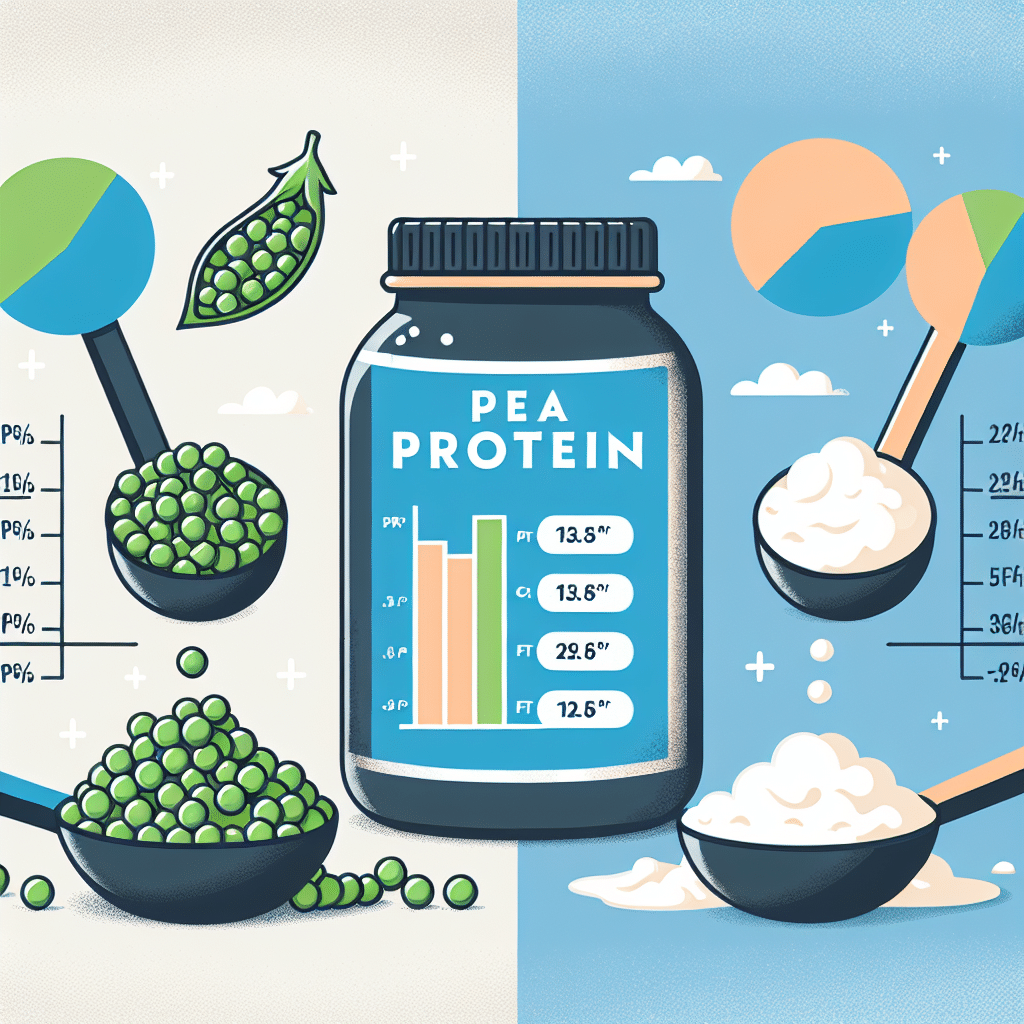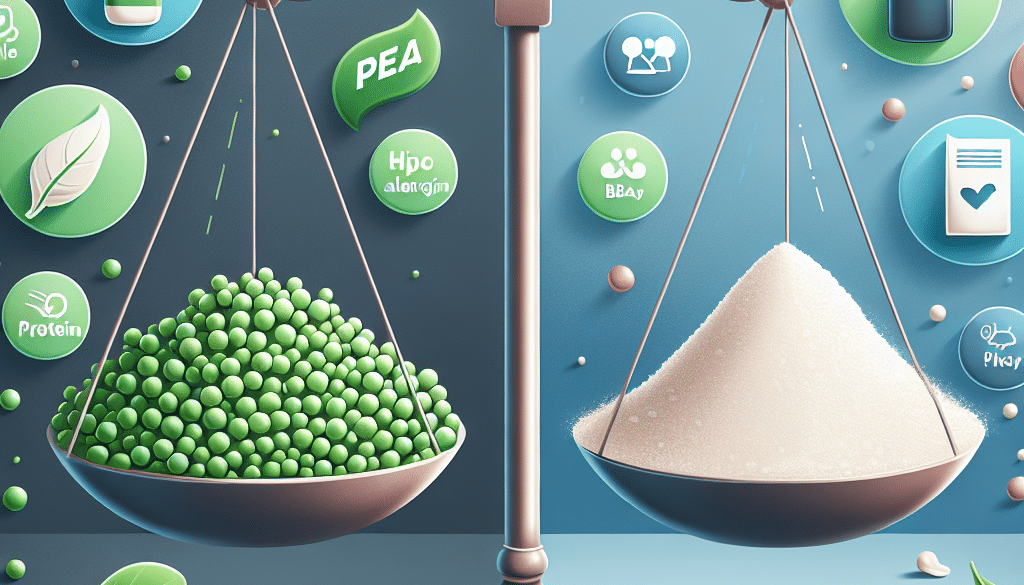Is pea or whey protein healthier?
-
Table of Contents
- Pea Protein vs. Whey Protein: Which Is the Healthier Choice?
- Understanding Protein Supplements
- Nutritional Profile Comparison
- Health Benefits and Considerations
- Pea Protein
- Whey Protein
- Digestibility and Absorption
- Potential Allergies and Intolerances
- Environmental Impact
- Case Studies and Research
- Conclusion: Making the Healthier Choice
- Discover ETprotein’s Premium Protein Products
Pea Protein vs. Whey Protein: Which Is the Healthier Choice?

When it comes to protein supplements, the debate between plant-based and animal-based sources is ongoing. Two of the most popular protein powders on the market are pea protein and whey protein. Each has its own set of benefits and potential drawbacks, and choosing the right one depends on individual dietary needs, health goals, and personal values. In this article, we’ll delve into the nutritional profiles, health benefits, and considerations of pea and whey protein to determine which might be the healthier option for you.
Understanding Protein Supplements
Protein supplements are a convenient way to increase your protein intake, especially if you have a busy lifestyle or increased protein requirements. They are commonly used by athletes, bodybuilders, and those looking to lose weight or enhance their overall health. Protein powders can be derived from various sources, with whey (from milk) and pea (from yellow split peas) being two prevalent choices.
Nutritional Profile Comparison
When comparing pea protein to whey protein, it’s essential to look at their nutritional content:
- Pea Protein: Typically vegan and hypoallergenic, pea protein is rich in iron and arginine, an amino acid beneficial for heart and muscle health. It’s also high in branched-chain amino acids (BCAAs), particularly valine, isoleucine, and leucine, which are crucial for muscle building.
- Whey Protein: Whey is a complete protein, meaning it contains all nine essential amino acids. It’s particularly high in leucine, which is known for its muscle-building properties. Whey protein also contains immunoglobulins and lactoferrin, which may support immune health.
Both proteins are low in fat and carbohydrates and can be enriched with vitamins and minerals during the manufacturing process.
Health Benefits and Considerations
Pea Protein
Pea protein is often celebrated for its sustainability and lower environmental impact compared to animal-based proteins. It’s suitable for those with lactose intolerance or dairy allergies and is considered a more inclusive supplement option for vegetarians and vegans. The iron content in pea protein can also be beneficial, especially for women or individuals following a plant-based diet who may be at risk of iron deficiency.
Whey Protein
Whey protein is renowned for its fast absorption rate, making it a favorite among athletes for post-workout recovery. The high leucine content is excellent for muscle synthesis, and the presence of bioactive compounds can be advantageous for immune support. However, whey protein is not suitable for vegans or individuals with lactose intolerance or dairy allergies.
Digestibility and Absorption
Whey protein is known for its high digestibility and rapid absorption, which is why it’s often recommended for post-exercise recovery. Pea protein, while still a good source of protein, may be absorbed more slowly and can sometimes be less digestible due to its fiber content. However, advancements in processing techniques have improved the digestibility of pea protein, making it a more competitive option.
Potential Allergies and Intolerances
One of the significant advantages of pea protein is its hypoallergenic nature. Whey protein, derived from dairy, can cause issues for those with lactose intolerance or a milk allergy. Pea protein offers a safe alternative for these individuals.
Environmental Impact
The production of pea protein generally has a lower environmental footprint than whey protein. Pea crops require less water and land and tend to emit fewer greenhouse gases compared to dairy farming. For those concerned about sustainability, pea protein might be the healthier choice for the planet.
Case Studies and Research
Several studies have compared the effects of pea and whey protein on muscle growth and recovery. A 2015 study published in the Journal of the International Society of Sports Nutrition found that pea protein promoted muscle thickness gains just as effectively as whey protein in participants involved in a 12-week resistance training program.
Another study highlighted that pea protein was just as effective as whey protein in supporting the body’s muscle repair process after exercise. These findings suggest that pea protein can be a viable alternative to whey protein for muscle building and recovery.
Conclusion: Making the Healthier Choice
Both pea and whey protein have their unique benefits and can be part of a healthy diet. The choice between them should be based on individual dietary needs, health goals, allergies or intolerances, and environmental considerations. Pea protein is an excellent option for those looking for a plant-based, hypoallergenic, and sustainable protein source. Whey protein is ideal for those who can tolerate dairy and are looking for a protein with a high absorption rate for muscle recovery.
In summary, neither pea nor whey protein is inherently healthier than the other; it ultimately depends on your personal circumstances and preferences.
Discover ETprotein’s Premium Protein Products
If you’re looking to incorporate high-quality protein supplements into your diet, consider ETprotein’s range of products. They offer both pea and whey protein options to cater to various dietary requirements and preferences. With a focus on purity, taste, and sustainability, ETprotein ensures that you’re getting the best protein supplements on the market.
Whether you’re an athlete, a fitness enthusiast, or simply looking to improve your health, ETprotein has a protein solution for you. Explore their offerings and find the perfect match for your nutritional needs.
About ETprotein:
ETprotein, a reputable protein and L-(+)-Ergothioneine (EGT) Chinese factory manufacturer and supplier, is renowned for producing, stocking, exporting, and delivering the highest quality organic bulk vegan proteins and L-(+)-Ergothioneine. They include Organic rice protein, clear rice protein, pea protein, clear pea protein, watermelon seed protein, pumpkin seed protein, sunflower seed protein, mung bean protein, peanut protein, and L-(+)-Ergothioneine EGT Pharmaceutical grade, L-(+)-Ergothioneine EGT food grade, L-(+)-Ergothioneine EGT cosmetic grade, L-(+)-Ergothioneine EGT reference grade and L-(+)-Ergothioneine EGT standard. Their offerings, characterized by a neutral taste, non-GMO, allergen-free attributes, with L-(+)-Ergothioneine purity over 98%, 99%, cater to a diverse range of industries. They serve nutraceutical, pharmaceutical, cosmeceutical, veterinary, as well as food and beverage finished product distributors, traders, and manufacturers across Europe, USA, Canada, Australia, Thailand, Japan, Korea, Brazil, and Chile, among others.
ETprotein specialization includes exporting and delivering tailor-made protein powder and finished nutritional supplements. Their extensive product range covers sectors like Food and Beverage, Sports Nutrition, Weight Management, Dietary Supplements, Health and Wellness Products, and Infant Formula, ensuring comprehensive solutions to meet all your protein needs.
As a trusted company by leading global food and beverage brands and Fortune 500 companies, ETprotein reinforces China’s reputation in the global arena. For more information or to sample their products, please contact them and email sales(at)ETprotein.com today.












